
Carl Henry Vogt, known professionally as Louis Calhern, was an American stage and screen actor. For portraying Oliver Wendell Holmes in the film The Magnificent Yankee (1950), he was nominated for the Academy Award for Best Actor.
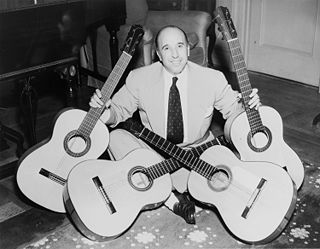
This is a list of notable events in music that took place in the year 1954.

Jane Powell was an American actress, singer, and dancer who first appeared in Metro-Goldwyn-Mayer musicals in the 1940s and 50s. With her soprano voice and girl-next-door image, Powell appeared in films, television and on the stage. She was notable for her performances in A Date with Judy (1948), Royal Wedding (1951), Seven Brides for Seven Brothers (1954), and Hit the Deck (1955).
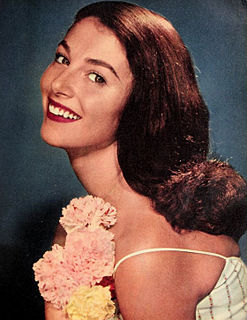
Pier Angeli, also credited under her birth name, Anna Maria Pierangeli, was an Italian-born television and film actress who starred in American, British and European films throughout her career. Her American motion picture debut was in the starring role of the film Teresa (1951), for which she won a Golden Globe Award for Young Star of the Year - Actress. She also worked as a singer and model.

Richard Thorpe was an American film director best known for his long career at Metro-Goldwyn-Mayer.
That's Entertainment! is a 1974 American compilation film released by Metro-Goldwyn-Mayer to celebrate the studio's 50th anniversary. The success of the retrospective prompted a 1976 sequel, the related 1985 film That's Dancing!, and a third installment in 1994.

That's Entertainment! III is a 1994 American documentary film released by Metro-Goldwyn-Mayer to celebrate the studio's 70th anniversary. It was the third in a series of retrospectives that began with the first That's Entertainment! (1974) and That's Entertainment, Part II (1976). Although posters and home video packaging use the title without an exclamation mark, the actual on-screen title of the film uses it.
Hugh Martin was an American musical theater and film composer, arranger, vocal coach, and playwright. He was best known for his score for the 1944 MGM musical Meet Me in St. Louis, in which Judy Garland sang three Martin songs, "The Boy Next Door," "The Trolley Song," and "Have Yourself a Merry Little Christmas." The last of these has become a Christmas season standard in the United States and around the English-speaking world. Martin became a close friend of Garland and was her accompanist at many of her concert performances in the 1950s, including her appearances at the Palace Theater.

Joseph Herman Pasternak was a Hungarian-American film producer in Hollywood. Pasternak spent the Hollywood "Golden Age" of musicals at MGM Studios, producing many successful musicals with female singing stars like Deanna Durbin, Kathryn Grayson and Jane Powell, as well as swimmer/bathing beauty Esther Williams' films. He produced Judy Garland's final MGM film, Summer Stock, which was released in 1950, and some of Gene Kelly’s early breakthrough roles. Pasternak worked in the film industry for 45 years, from the later silent era until shortly past the end of the classical Hollywood cinema in the early 1960s.
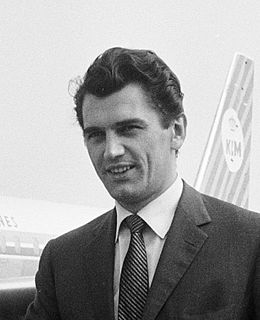
Edmund Anthony Cutlar Purdom was an English actor, voice artist, and director. He worked first on stage in Britain, performing various works by Shakespeare, then in America on Broadway and in Hollywood, and eventually in Italy. He is perhaps best known for his starring role in 1954's historical epic The Egyptian.
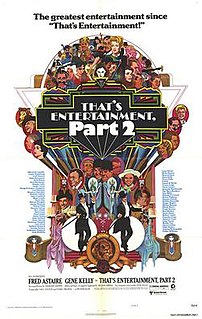
That's Entertainment, Part II is a 1976 American compilation film released by Metro-Goldwyn-Mayer and a sequel to That's Entertainment! (1974). Like the previous film, That's Entertainment, Part II was a retrospective of famous films released by MGM from the 1930s to the 1950s.

The Student Prince is a 1954 American musical film directed by Richard Thorpe and starring Ann Blyth, Edmund Purdom, John Ericson, Louis Calhern, Edmund Gwenn, S. Z. Sakall and Betta St. John. The film is an adaptation of the 1924 operetta of the same name composed by Sigmund Romberg with lyrics by Dorothy Donnelly. The film's screenplay was written by Sonya Levien and William Ludwig.
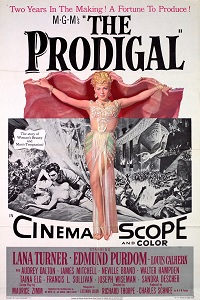
The Prodigal is a 1955 Eastmancolor biblical epic CinemaScope film made by MGM starring Lana Turner and Edmund Purdom. It was based on the New Testament parable about a selfish son who leaves his family to pursue a life of pleasure. The film also features James Mitchell, Louis Calhern, Joseph Wiseman, Cecil Kellaway and Walter Hampden. The dancer Taina Elg made her film debut.
The 8th Golden Globe Awards, honoring the best in film for 1950 films, were held on February 28, 1951, in the Ciro's nightclub in West Hollywood, California, at 8433 Sunset Boulevard, on the Sunset Strip.

Jupiter's Darling is a 1955 American Eastman Color musical romance film released by MGM and directed by George Sidney filmed in CinemaScope. It starred Esther Williams as the Roman woman Amytis, Howard Keel as Hannibal, the Carthaginian military commander and George Sanders as Fabius Maximus, Amytis's fiancé. In the film, Amytis helps Hannibal swim the Tiber River to take a closer look at Rome's fortifications.

Hit the Deck is a 1955 American musical film directed by Roy Rowland and starring Jane Powell, Tony Martin, Debbie Reynolds, Walter Pidgeon, Vic Damone, Gene Raymond, Ann Miller, and Russ Tamblyn. It is based on the 1927 stage musical of the same name – which was itself based on the hit 1922 play Shore Leave by Hubert Osborne – and was shot in CinemaScope. Although the film featured some songs from the stage musical, the plot was different. Standards featured in the film include "Sometimes I'm Happy", "I Know that You Know", and "Hallelujah".

Dangerous When Wet is a 1953 American live-action/animated musical comedy film starring Esther Williams, Fernando Lamas and Jack Carson, directed by Charles Walters and featuring an animated swimming sequence starring Williams with the cat-and-mouse duo Tom and Jerry.

Two Weeks with Love is a 1950 romantic musical film made by Metro-Goldwyn-Mayer. It was directed by Roy Rowland and based on story by John Larkin, who co-wrote the screenplay with Dorothy Kingsley.

The King's Thief is a 1955 swashbuckling CinemaScope adventure film directed by Robert Z. Leonard, who replaced Hugo Fregonese during filming. Released on August 5, 1955, the film takes place in London at the time of Charles II and stars Ann Blyth, Edmund Purdom, David Niven, George Sanders and Roger Moore.

Skirts Ahoy! is a 1952 MGM musical film directed by Sidney Lanfield and starring Esther Williams, Vivian Blaine and Joan Evans. It was shot in Technicolor. The film follows the adventures of several women who join the WAVES with sequences filmed on location at the Great Lakes Naval Training Station. It also features the film debut of Billy Eckstine.

















